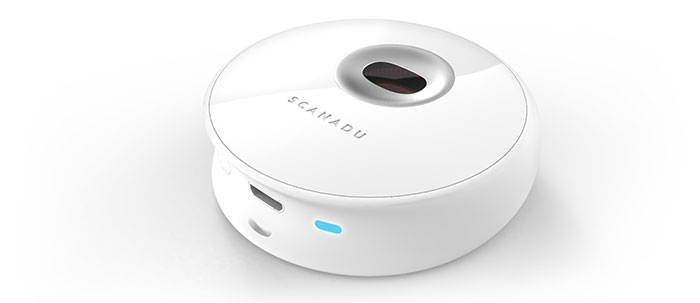You know it, we know it: the 3D printer is the forefather of the replicator, not MakerBot’s Replicator but Star Trek’s replicator, the incredible machine on the Enterprise’s deck that could compress energy and re-align molecules to reproduce anything and everything (and somehow was used primarily to make tea). Our contemporary version of the replicator (but perhaps it would be more proper to call it a “creator”), the FDM type to be precise, was just used by Solid Concepts, one of the largest “replicating” companies in the world, to create yet another item straight out of the Star Trek universe: the Tricorder.
The fictional medical scanner, commonly used by Star Trek doctors to analyze patients in a non-invasive way, is now at hand even for our primordial, non space-warping civilization. In fact it has been the main goal of the Qualcomm Tricorder X Prize, a $10 million competition to develop a portable health and vital sign scanner. Scanadu, a start-up funded by Walter De Brouwer may soon be the first company to make its tricorder commercially available by introducing what will be the first new home-based diagnostic tool since the invention of the thermometer, sometime during the XVII century.
The Scanadu Scout is one of the most exciting new technologies to arrive on the market. By just placing it near the forehead its algorithmic software is able to read temperature, heart rate, breathing rate, systolic and diastolic blood pressure and even emotional stress and blood oxygenation. It was publicly unveiled at last January’s CES in Las Vegas. Its development has attracted big name partners such as the NASA Ames Research Lab and a total of over $12 million in funding, both from venture capitalists (Relay Ventures, Tony Hsieh and Jerry Yang) and through an amazingly successful Indiegogo campaign (where it raised $1,664,574, well over its original $100,000 goal).
All this was made possible with 3D printing, in this case services supplied by Solid Concepts. Scanadu turned to the Valencia (CA) based 3D printing bureau, which was recently acquired by Stratasys, for help in building a working prototype, which, as revealed by De Brouwer, was used in the Scanadu labs to “finely tune algorithms, finalize product design, enhance user experience, and, ultimately, to demonstrate the product’s potential and secure investors.”
“We provided a large number of prototype casings/structures for the Scout,” Alyssa Parkinson, Solid Concepts’ Marketing Communication Specialist, told me. “We used a Fused Deposition Modeling (FDM) process with ABS thermoplastics. Solid Concepts also provided finishing and cosmetic black paint to the first round of prototypes, while the second round of prototypes was delivered without cosmetic finishing.”
Although the project turned out to be quite fascinating, Scanadu reached out to Solid Concepts for prototyping as any regular customer. “I learned about the project through a nice email from one of Scanadu’s engineers – Alyssa told me – “thanking us for our finishing work. He put me in contact with their PR department which in turn put me in contact with Mr. De Brouwer. The project was particularly appealing to me, as someone who gets sick often and hates the doctor’s office.”
“Medical technology is one of Solid Concepts key industries,” Alyssa went on. “As you can imagine, it’s a very proprietary industry, and we don’t often get the opportunity to share projects. This recent trend of crowd-funding for medical devices really seems to be changing that kind of secrecy in the field. Projects are introduced and shared with the public before they’re market ready, and certain information has to be public in the case of Kickstarter projects. I’m really interested in these trends.”



